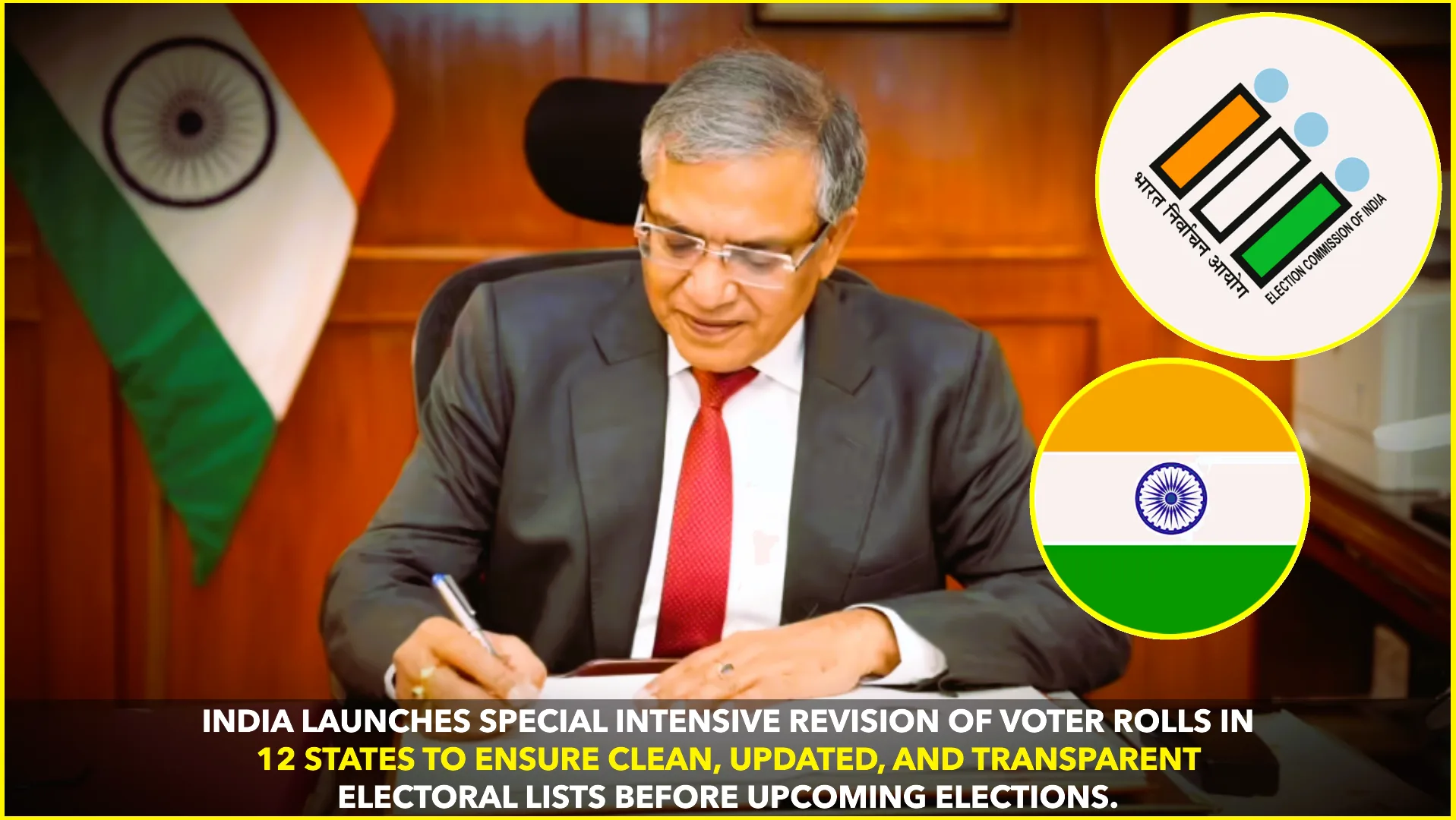In a landmark move to strengthen electoral transparency, the Election Commission of India (ECI) has announced a Special Intensive Revision (SIR) of voter rolls across 12 states and union territories, marking the most extensive revision effort in over two decades.
According to the Election Commission, the initiative aims to ensure that every eligible voter is accurately listed and that duplicate or outdated entries are removed ahead of upcoming elections. This large-scale verification process will cover states and UTs such as Uttar Pradesh, West Bengal, Tamil Nadu, Kerala, Gujarat, Rajasthan, Chhattisgarh, Madhya Pradesh, Goa, Puducherry, Lakshadweep, and the Andaman and Nicobar Islands. (Source: NDTV)
The Process: Door-to-Door Verification
Starting November 4, Booth Level Officers (BLOs) will go door-to-door to verify voter information and collect updated details from households. The enumeration phase will run until December 4, after which draft rolls will be published on December 9, giving citizens the opportunity to check and raise claims or objections. The final revised electoral rolls are expected to be published by February 7, 2026. (Source: NewsOnAir)
For existing voters listed in previous rolls, additional documents are not required unless there is an objection. However, new voters or those missing from earlier lists will need to submit eligibility proofs such as age, residence, and identity documents. (Source: Vajiram & Ravi)
Why This Matters
This is the first comprehensive voter roll revision since 2002–04, making it a crucial step toward improving electoral accuracy. The ECI noted that issues like migration, duplicate entries, deaths, and missing voter names have led to inaccuracies that must now be corrected through physical verification.
The SIR is expected to involve verification of around 510 million (51 crore) voters across the 12 participating states and UTs. The move is being hailed as a proactive attempt to restore faith in the integrity of India’s electoral system and to prepare for the next round of Assembly and Lok Sabha elections. (Source: Times of India)
Ensuring Transparency and Fairness
The ECI emphasized that transparency is at the core of this initiative. Political parties will be briefed at every stage to ensure cross-verification and build public confidence. The commission has also urged citizens to cooperate with BLOs and verify their voter details during home visits.
The entire process will be monitored using digital voter roll management tools and geo-tagged data collection, allowing real-time updates and minimizing errors during the verification process. (Source: Economic Times)
Political Reactions and Concerns
While the initiative has been largely welcomed, some opposition parties have expressed concerns about the timing and potential risk of voter exclusion — particularly in areas with high migration or marginalized communities. They argue that additional documentation requirements could create unnecessary hurdles for genuine voters.
The ECI responded that the SIR includes a transparent claims and objections phase, ensuring every citizen can verify and correct their information. The Commission also clarified that voter deletions will only occur after due process and multiple levels of verification. (Source: New Indian Express)
Challenges Ahead
Executing such a vast verification exercise is not without challenges. With thousands of BLOs working across rural and urban regions, logistical issues such as data management, manpower training, and coverage in remote areas remain key concerns. Additionally, maintaining data security during collection and digitization is critical to avoid leaks or misuse.
Experts suggest that strong coordination between state election offices, district administrators, and polling officials will be vital for success. If executed properly, this could become a model for other states to follow in future nationwide voter list updates. (Source: Hindustan Times)
Looking Forward
The SIR’s outcome will have a significant bearing on the 2026 Assembly elections in several of the participating states. Updated, error-free rolls mean fewer disputes, reduced instances of fake or duplicate votes, and a more inclusive democratic process.
For voters, the message is clear — verify your details, ensure your name is listed, and participate in the process. The success of this massive initiative depends on public cooperation as much as administrative execution.
The Election Commission’s goal is not just to update names but to rebuild trust in India’s democratic machinery — one verified voter at a time. (Source: The Hindu)










